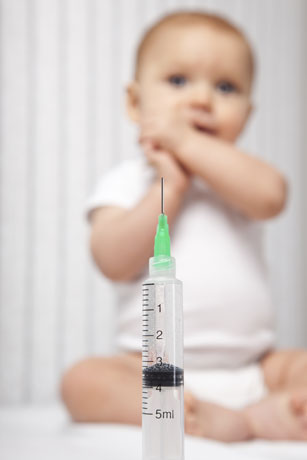 It’s time to ask ourselves, how much more evidence do we need to convince parents that vaccinations are safe?
It’s time to ask ourselves, how much more evidence do we need to convince parents that vaccinations are safe?
In 2011, the National Academy of Sciences announced the results of an examination of more than 1,000 research studies on vaccine safety. The 600-page report boils down to one conclusion: While vaccines are “not free” from side effects, those effects are “very rare or very mild.”
Yet, take Connie (she asked that her real name not be used).
“We don’t do shots,” she says, cradling her 11-month-old daughter. Why? She’s heard that shots can cause side effects such as autism. She worries about stories she reads in the news. Weren’t steroid injections recently tied to an outbreak of meningitis? For Connie, the risk of giving her three kids shots just “seems too great.”
Washington state law now requires families to talk with a health-care worker and obtain a doctor’s signature before getting an exemption from state vaccination requirements. (For a current list of those requirements, see “Resources.”) Although this measure, which went into effect in 2011, makes opting out more difficult, Connie gets an exemption for her kids.
This basic distrust of the medical establishment can be frustrating for experts such as Michelle Roberts, immunization health promotion manager for the Washington State Department of Health. “The diseases we immunize against are really scary,” she says. “Choosing not to immunize is not a risk-free decision.”
Roberts points to France, where a measles outbreak last year infected a whopping 14,000 kids, killing six. Investigators at the federal Centers for Disease Control and Prevention (CDC) found that most of the infected kids in France were either unvaccinated or had a vaccination status of “unknown.”
How the myth began
Researchers trace concerns about the link between shots and autism to a controversial 1998 article published in the medical journal The Lancet. The article stopped short of claiming that there was an actual link between autism and one particular vaccine, MMR (measles, mumps and rubella), but suggested further research be done.
But in 2004, 10 of the original authors retracted their support of the study because of questions surrounding the research and concerns about the “major public health implications” caused by the mere suggestion of a link to autism. And in 2010, amid mounting evidence of what it called “ethical issues,” The Lancet also retracted the article in full.
Despite the retractions and recent studies showing no link between the MMR shot and autism, the fears persist. As Roberts asks, “How do you unscare someone?” The same kinds of fears surround thimerosal, a preservative containing mercury, long used in vaccines. Although no studies indicate that thimerosal is linked to autism, the preservative has been phased out since 2001. Today, the vast majority of kids’ vaccines are free of thimerosal.
Do vaccines work?
In 2012, Washington suffered from the worst epidemic of pertussis (whooping cough) since widespread vaccinations began. Many parents were concerned to hear that even kids who had been vaccinated were also falling ill. This raises the unnerving question, how well do vaccines work?
“Vaccines are very effective, but not perfect,” Roberts notes. In addition, our understanding of diseases — and how to prevent them — can change.
That seems to be happening with DTaP, the current pertussis vaccine. To be protected, a child must get five shots over a period of four–six years. First used in the late 1990s, the shot was seen as a great leap forward, because it had fewer side effects than the previous drug used. But the recent outbreaks here and elsewhere have made many researchers believe the current vaccine’s protection wanes earlier than hoped. This new information has sent health officials scrambling to find ways to make the current shot more effective — or find a longer-lasting option.
Despite the work ahead of her, Roberts is optimistic. She points out that even in 2011, when we had the highest vaccine exemption rate in the country — 6.2 percent — most kids in Washington state were inoculated. And with the new law that raises the requirements for exemption now in effect, the opt-out rate decreased in 2012.
Yet, some families still worry. Roberts wants those families to understand that rigorous tracking and safety checks are in place for childhood vaccines. Unlike adult drugs, vaccines for kids are tracked and monitored closely. In fact, she says, they get more scrutiny than the Tylenol a parent might give their child for pain. “If parents look at the evidence, they will see that the benefits of vaccination far, far outweigh the risks,” she says.
Kathryn Russell Selk is a Seattle-based freelance writer and public defender.
Learn more
The CDC answers questions about vaccine safety, with links to scientific articles and specific information about each of the relevant vaccines.
The state Department of Health offers information on vaccines, addresses safety and parental concerns, and includes a downloadable chart of recommended immunizations (in Spanish and English).
Go to Seattle Children’s Hospital for information about why certain immunizations are recommended and their
possible risks.
What your child needs
The CDC and American Academy of Pediatrics recommend the following schedule of shots for your child’s first 24 months.
Birth: Hepatitis B (HepB) vaccine
1–2 months: HepB
2 months: Rotavirus vaccine (RV), diphtheria, tetanus and pertussis (DTaP) vaccine, haemophilus influenzae type B “Hib” immunization (protects against a disease that can result in such things as meningitis and death), pneumococcal vaccine (PCV) and polio vaccine (IPV)
4 months: RV, DTaP, Hib, PCV and IPV
6 months: RV, DTaP, Hib and PCV
6–18 months: IPV and HepB
6 months: Influenza vaccine (yearly)
12–15 months: Hib, PCV, measles, mumps and rubella (MMR) vaccine, and varicella (chicken pox) vaccine
12–24 months: Hepatitis A (HepA) vaccine
15–18 months: DTaP
Free shots
In Washington, the state pays for vaccines for every child ages newborn–18 years old. Get information at the Family Health Hotline, 800-322-2588.











